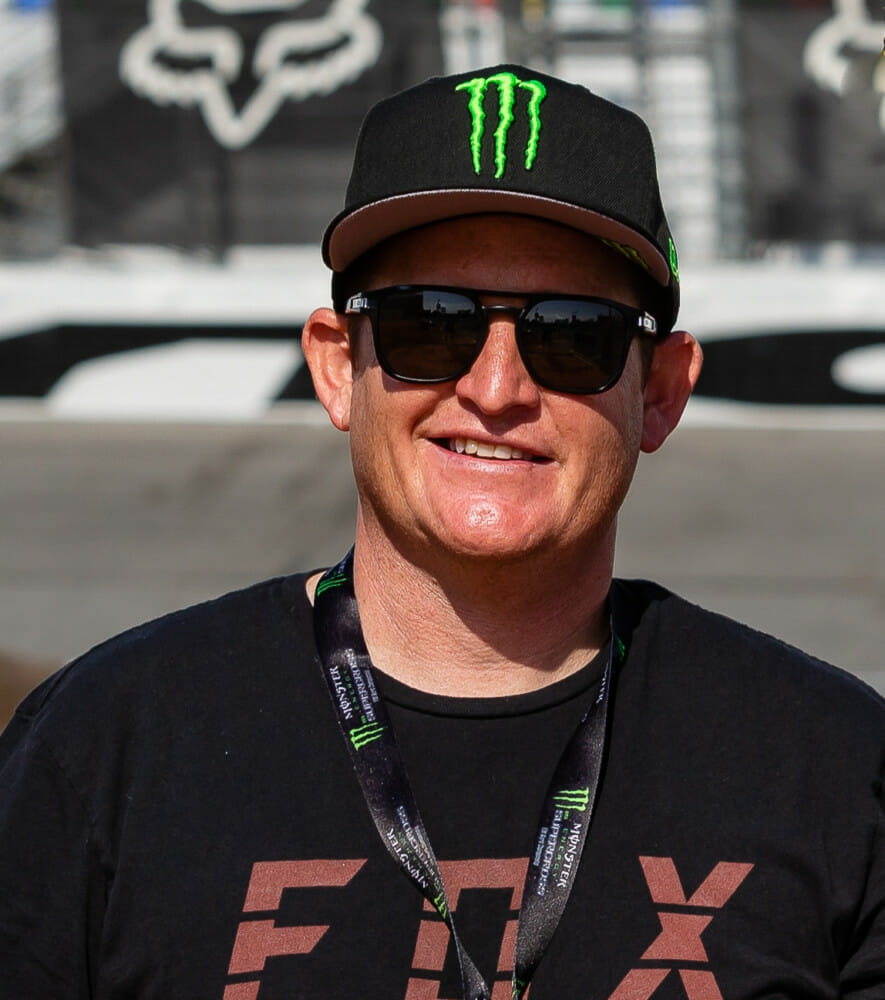Steve Cox | March 20, 2019
Cycle News Empire of Dirt
COLUMN
TV Personality Ricky Carmichael
When it was announced that Ricky Carmichael was taking Jeff Emig’s place alongside Ralph Sheheen to do the television announcing for the 2019 Monster Energy/AMA Supercross Series on NBC Sports, I was skeptical. I like Jeff Emig, but my skepticism wasn’t based on loyalty to Fro-daddy. My skepticism was based on Carmichael’s racing success.
If that seems like a weird reason, let me explain: People (and dogs) learn either through positive results or negative results. If you try something, and you succeed, you learn one thing that works. If you fail, you learn one thing that doesn’t work. And, over time, if a person succeeds almost all the time, and very seldom fails, I think that limits the breadth of knowledge you can bring to the table on any given subject. Failures make people smarter.
 Ricky Carmichael has taken Jeff Emig’s place alongside Ralph Sheheen to do the television announcing for the 2019 Monster Energy/AMA Supercross Series on NBC Sports.
Ricky Carmichael has taken Jeff Emig’s place alongside Ralph Sheheen to do the television announcing for the 2019 Monster Energy/AMA Supercross Series on NBC Sports.
In the NFL, former Dallas Cowboy’s quarterback Tony Romo has become almost legendary as a television announcer in a very short period of time by his ability to describe the decision-making process and predict play-calls and results. I believe this has as much to do with his successes as it does with his failures as a player.
Jeff Emig won four championships during his career, but he lost way more than he won. Ricky Carmichael lost a total of three championships in his entire professional career—his first 125cc Supercross title and his first two 250cc Supercross titles. That’s it. He won every single other championship, comprising 16 total (10 MX titles, five SX titles and one regional SX title). Carmichael didn’t fail enough as a racer to give him the necessary perspective to speak about what racers are going through when times are tough.
This doesn’t just apply to announcing. I think this is also true when it comes to coaching. If I had a child who wanted to learn about riding and racing motocross, I’d want them to learn from somebody who lost more than they won. Timmy Ferry would be a great motocross coach, for example.
At the start of the season, things weren’t looking good for Carmichael as an announcer, but in hindsight, I think he was trying to find his legs. By around the halfway point of the series, Carmichael won me over. Like Romo in the NFL, Carmichael can describe what’s going through racers’ heads no matter what position they’re in. He tells the audience why racers make the choices they make. He still occasionally falls into the trap of calling out lap times or reciting running orders like Emig used to do, which usually means he’s looking at a computer screen instead of what’s happening on the track. (It’s pretty annoying unless it’s directly applicable to what’s happening on the track or in the championship.) However, on the whole, his insight is really valuable.
During the Atlanta round, after Marvin Musquin tagged his teammate (and race leader) Cooper Webb in a corner. Carmichael said of the incident: “That’s when you know things are going good for you, Ralph; when you make a mistake in the whoops, and your teammate or someone has the position to pass you, and it ends up working out worse for the guy behind you!” This seems like a minor comment, but in context, this was a thing that Carmichael thought about a lot during his racing career. Chad Reed even used to say that Carmichael had a horseshoe shoved up his butt because it seemed like even when Carmichael made a mistake, he’d gain time with it. I can vividly remember many occasions when Carmichael would swap like crazy going into a corner but somehow his motorcycle would always seem to swap right into the rut he wanted to hit, and he’d be on the gas on gone, adding another couple tenths of a second to his lead.
Following that incident, Carmichael went on to say: “I believe that the reason that Cooper lost his balance through the whoops is because that was his first time jumping through there. He probably sensed maybe that that’s where Marvin was gaining the time on him and made the adjustment, but he just needed to get his timing right.”
After the race, Webb volunteered this: “The track was changing a lot, and I knew where I was good, but I was also getting caught by Marv [Musquin] in the beginning in some places. I knew where [the whoops], but I wasn’t sure what line. When you’re out front, you can’t see where you’re going slow or not, so I was trying to hit my marks, and I felt like they weren’t working as well as I’d like them to, so I started searching. And you make some mistakes as the race goes on, and I actually felt like I kind of, toward the end, started hitting some better lines.”
Carmichael told us precisely what was going on with Webb, and he does it all the time if you pay attention to what he’s saying.
So, I think I owe Carmichael an apology about my skepticism. And maybe I owe him an apology about what I think about him as a racer, too, because when he was racing he played his cards close to his chest with the media and didn’t let us know all of what he knew, so I used to think that his success was mostly just raw speed and determination. However, he has proven during his short (so far) tenure as an announcer that he was a much more cerebral racer than most of us probably realized at the time. CN